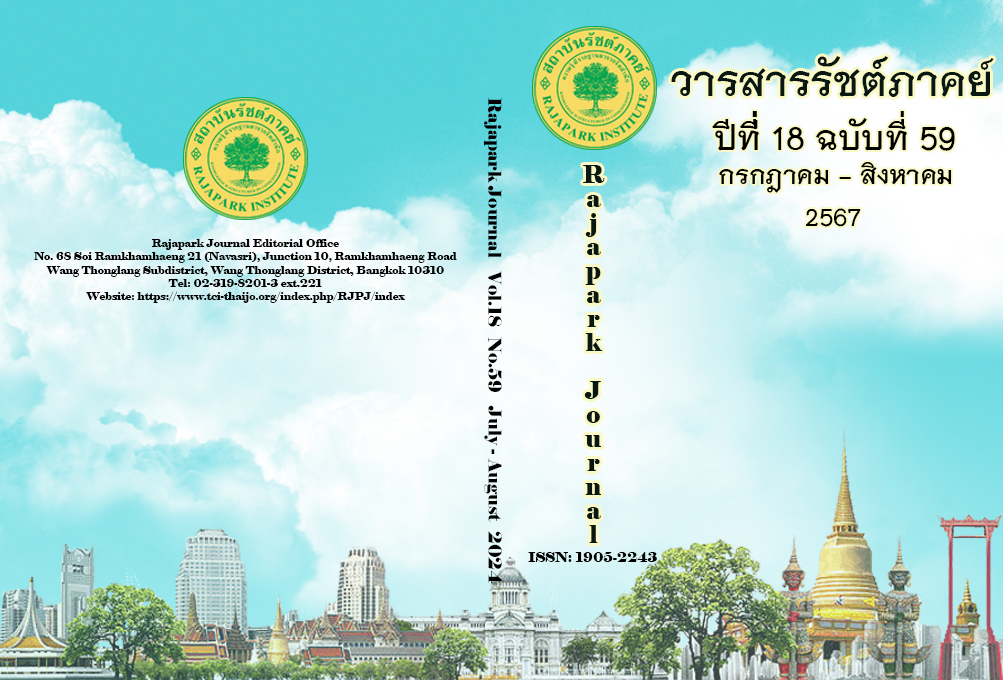Democratic Active Citizenship of Mahamakut Buddhist University Students
Main Article Content
Abstract
This research aimed to: 1) study active citizenship in the democratic society of Mahamakut Buddhist University students; 2) analyze the behaviors and roles of active citizenship in the democratic society of Mahamakut Buddhist University students; and 3) propose guidelines for enhancing active citizenship in a democratic society of Mahamakut Buddhist University students using mixed-method research methodology. The data was collected by using a questionnaire with a reliability of 0.960 from a sample size of 397, and 10 key informants. The data from the questionnaire was analyzed using descriptive statistics, and the data from the in-depth interview was analyzed using content analysis. The results of the research were as follows: 1. The active citizenship in the democratic society of the Mahamakut Buddhist University was divided into 5 aspects, namely: 1) responsibility to society and service mind; 2) respect for individual rights; 3) acceptance of individual diversity; 4) participation; and 5) principle of equality. 2. The analysis results showed that the overall behaviors and roles of active citizenship in the democratic society of Mahamakut Buddhist University students were at a very high level. When considering the truth as a whole, it was at a high level, and when considering the expectation, as a whole, it was at a high level. 3. The guidelines for enhancing active citizenship in a democratic society for Mahamakut Buddhist University students were divided into 4 guidelines: 1) learning management outside the classroom; 2) having a variety of curriculum; 3) having an appropriate atmosphere; and 4) creating networks.
Article Details

This work is licensed under a Creative Commons Attribution-NonCommercial-NoDerivatives 4.0 International License.
Views and opinions appearing in the Journal it is the responsibility of the author of the article, and does not constitute the view and responsibility of the editorial team.
References
Asvapoositkul, P. (2019). Service learning in the library and information science curriculum. Journal of Library and Information Science Srinakharinwirot University, 12(1), 98-111. https://ejournals.swu.ac.th/index.php/jlis/article/view/11532
Ayuwat, T. (2020). Student flash mob: Criminology perspective. In Compilation Book Article at the National Legal Social Science Conference (pp. 215-225), Topic: “New Imagination Landscape of Thai jurisprudence”. https://www.law.cmu.ac.th
Burikul, T. (2008). The role of civic development (Civic Education) for sustainable democracy: Thai-German experience exchange. In Presented at a seminar on Thursday, February 7, 2008, organized by the Institute in Collaboration with the Faculty of Political Science, Chulalongkorn University, and the Friedrich Ebert Foundation.
Burikul, T. et al. (2020). Study of citizenship behavior for Thai society. https://www.kpi.ac.th/knowledge/book/data/1108
Chanthawan, N. (2016). Democratic Citizenship: A case study of undergraduates at the main campus of Ramkhamhaeng University. Academic Journal Phra Nakhon Rajabhat University, 7(1), 103-104. https://so01.tci-thaijo.org/index.php/AJPU/article/view/63497
Harlap, Y. (2011). Road to global citizenship. UNICEF, and The University of British Columbia. https://ctlt.ubc.ca/files/2011/05/rgctoolbook.pdf
Jongsathitwattana, K. (2017, Feb 28). The new human species active citizen. Post Today. https://www.posttoday.com/life/life/482995
Kraiwichian, T. (1975). Democracy. Royal Thai Survey Department Printing House.
Lipset, M. S. (1964). Religion and politics in the American past and present in religion and social conflict. Oxford University Press.
Lough, B. J., & McBride, A. M. (2013). Navigating the boundaries of active global citizenship. Transactions of The Institute of British Geographers.
Maesincee, S. (2013). The world changes, Thailand adjusts. Krungthep Turakij.
Mahamakut Buddhist University Srilanchang Campus. (2014). Annual report 2014. https://www.mbuslc.ac.th/web/wp-content/uploads/published
Mueanpiw, N. (2018). The developing of Thai citizens for global citizens in Thailand 4.0. Journal of Education Chulalongkorn University, 46(3), 86-99. https://so02.tci-thaijo.org/index.php/EDUCU/article/view/148072
Ninlapha, K., & Sutthirat, C. (2023). The development of learning activities by social learning service in order to enhance participation citizen of active citizenship for grade 6 students. Journal of Roi Kaensarn Academi, 8(1), 177-196. https://so02.tci-thaijo.org/index.php /JRKSA/article/view/257691
Office of the Secretariat of the Council of Education. (2018). Guidelines for promoting global citizenship (Global Citizenship): International experiences. Office of the Secretariat of the Council of Education.
Parnichparinchai, T., & Parnichparinchai, J. (2017). Citizenship of undergraduate students in Naresuan University. The Golden Teak: Humanities and Social Sciences Journal (GTHJ), 23(1), 1-13. https://so05.tci-thaijo.org/index.php/tgt/article/view/89236
Phacharoen, W. (2018). Characteristics of good citizenship in a democratic society of students. Maejo University. Journal of Nakhon Lampang Sangha College, 7(2), 115-127. https://so04.tci-thaijo.org/index.php/NBJ/article/view/252932
Pongphasuk, S. (2015). The administration for characterization of citizenship in student at school under municipality[Doctoral dissertation, Silpakorn University]. https://sure.su.ac.th/xmlui/handle/123456789/20060
Rattanamuk, S. (2014). Learning through social service and creating socially conscious. citizenship: Report on research results. Volunteer Graduate Office Thammasat University.
Reysen, S., & Katzarska-Miller, I. (2013). A model of global citizenship: Antecedents and outcomes. International Journal of Psychology, 48(5), 858–870. https://doi.org/10.1080/00207594.2012.701749
Saengnil, N. (2018). Strategies for enhancing global citizenship characteristics in students. Secondary school Nan Province[Doctoral dissertation, Chiang Mai Rajabhat University]. http://cmruir.cmru.ac.th/handle/123456789/1886
Samakoses, V. (2017). Education to create citizenship. http://www.moe.go.th/
Sonwa, S., Jai-aree, A., & Sujjasophon, R. (2021). The synthesis of human resource development process to a democratic community. Journal of Politics and Governance, 11(3), 45–65. https://so03.tci-thaijo.org/index.php/jopag/article/view/256580
Tantisunthon, T. (2014). Citizens, human rights and democracy. Institute Educational policy under the Foundation for the Promotion of Educational Policy. https://kpi-lib.com/library/books/kpibook-31100/
Thaewanarumitkul, P. (2012). Civic education. Nanmeebooks. https://kpi-lib.com/library/en/books/kpibook-19662/
Tharapwasu, S. (2019). Development of students’ citizenship characteristics in educational Management under education 4.0 in Suan Sunandha Rajabhat University. Journal of Educational Administration Silpakorn University, 10(1), 874-887. https://so02.tci-thaijo.org/index.php/EdAd/article/view/213869
Thawainin, P., & Sukjairungwattana, T. (2019). Guidelines of educational management for citizenship of undergraduate student, Silpakorn University. Veridian E Journal, Silpakorn University (Humanities, Social Sciences, and Arts), 12(5), 1585-1603.
https://he02.tci-thaijo.org/index.php/Veridian-E-Journal/article/view/203945
Thepayakul, R. (2011). Citizenship Education. Journal of Democratic Learning, 3(9). http://www.curriculumandlearning.com/upload/EPUB/citizenship_1441926096.pdf
Wongsurawat, K. (2000). Basics of political science and politics in the 21st century[Master’s thesis, Thammasat University].
Yamane, T. (1973). Statistics: An Introductory Analysis (3rd ed.). Harper and Row.


